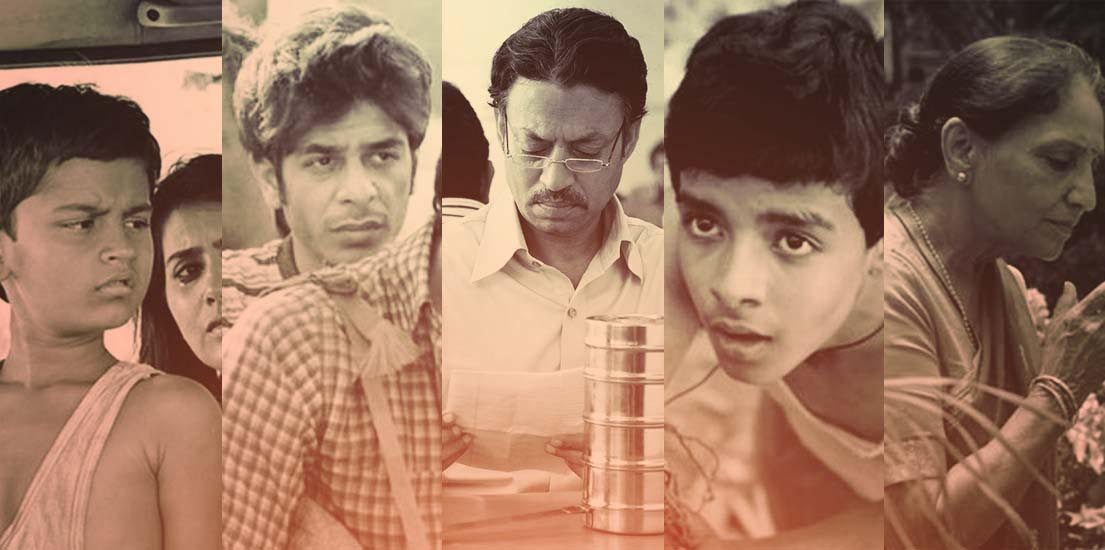10 Years/10 Films: The Best of Film Bazaar’s Screenwriters’ Lab
“You can’t fix a bad script after you start shooting. The problems on the page only get bigger as they move to the big screen.” – Howard Hawks
2016 marks the 10th year of National Film Development Corporation’s Film Bazaar Screenwriters’ Lab. A turning point for many quality, content-driven scripts, there are many filmmakers who have found perspective, and even an unexpected sense of writerly solidarity, in these hallowed chambers of constructive criticism.
Held in collaboration with a reputed international film festival every year, the Screenwriters’ Lab joins hands with Sarajevo Film Festival in 2016, in continued efforts to create a platform for budding filmmakers to hone their craft. Submissions for the Film Bazaar Screenwriters’ Lab (as well as the Children’s Screenwriters’ Lab) are open until the 29th of February, with the regular deadline being Feb 29, 2016 and the extended deadline March 15, 2016 for both the labs.
READ: NFDC FILM BAZAAR SCREENWRITERS’ AND CHILDREN’S SCREENWRITERS’ LAB 2016
In the past decade, there are ten films that have emerged from the NFDC Screenwriters’ Labs and made an indelible impact on the state of Indian cinema. These are films which have travelled to international festivals including the likes of Cannes, Venice and Toronto, and returned with critical acclaim from a variety of audiences.
Pandolin caught up with the filmmakers of these 10 game-changing films to find out more about the creative process behind developing their respective scripts.

Kanu Behl
Nominated for the Camera D’Or, Festival de Cannes 2014, Kanu Behl’s Titli depicted the themes of violence and patriarchy with an awe-inspiring sensitivity. “My script was selected for the NFDC Screenwriters’ Lab the year after Sharat Katariya (of Dum Laga Ke Haisha) worked on his script as a part of the lab,” Kanu Behl shared with Pandolin. “When I started writing Titli, I was talking to Urmi Juvekar (who co-wrote Oye Lucky… with Dibakar Banerjee) and I mentioned to her that I would like someone to write with, that this was not something that was all my own. She had been a mentor at the lab when Sharat was there; she was the one that introduced us to each other, and we really hit it off. I told him about my central conflicts, what I’ve gone through, what I want to talk about and he understood that. He has a tremendous sense of character, a certain serendipity, a certain surprise in a scene, he has a great sense about what a character is thinking at what point. And it’s always amazing for a writer-director to have that kind of a support.”
READ: TITLI STARTED WITH MY PERSONAL EXPERIENCES BUT GREW TO BE SOMETHING MORE – KANU BEHL
The man behind the heartwarming comedy Dum Laga Ke Haisha, Sharat Katariya, recounts his own experience, “Getting feedback on your script isn’t the easiest experience, because when the feedback comes in — that’s when you realise how far away you really are from where the script needs to be. It’s only in retrospect, that you realise what was missing. I’d definitely say the NFDC Screenwriters’ Lab was fruitful, and really worth it.”
“In the beginning, I dodged important questions that I should’ve been asking while writing the script — it was when I got back to rewriting it that I realised the flaws in it. Urmi Juvekar was my advisor, and she raised some important questions that gave me much-needed perspective. She helped me remove parts that weren’t helping the plot or advancing the story — sometimes, filmmakers have a sense of nostalgia attached to elements of the script which are not essential, but that they aren’t able to let go of. There needs to be reason enough for all of those elements to be included in the script, and the story.”
Ultimately, he explains, it was the technical part of writing and storytelling that the lab really helped him hone, as the process of writing his initial draft had been a freeflowing creative work sans restrictions.
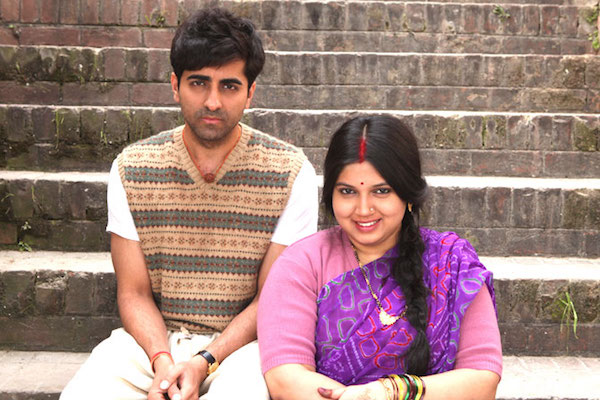
Dum Laga Ke Haisha
Bikas Mishra, director of the subtly powerful Chauranga, identified the NFDC Film Bazaar Screenwriters’ Lab as ‘one of the initial backends for scriptwriters’. Having been a part of the forum in 2010 he recalled that the lab was working in collaboration with Binger Film Lab that year, an Amsterdam-based agency/lab working with filmmakers and writers from all over the world.
“I was lucky to find a mentor in Marten Rabarts, who used to head Binger Film lab,” he recounted. “Writing a script about a godforsaken village in a corner of our country from a mountain resort at Locarno, was quite the bizarre experience. The script I finally made my film on, only came out because an opportunity like this existed, so it turned out to be very rewarding. I got advice from seasoned advisors who knew the craft of scriptwriting and storytelling.”
READ: CHAURANGA IS A FLAWED FILM BUT THE IDEA WAS NEVER TO MAKE A PERFECT FILM – BIKAS MISHRA
He shared with us an interesting perception of the Screenwriters’ Lab that is very common —
“People think that it’s like a clinic, and an advisor or a script doctor will tell you what’s wrong with your script, and how to correct it. My script was so specifically rooted in my culture and my country, that I was worried they might not be able to understand the related intricacies. These were biases I shed quickly, as they’re just not true — something I realised with experience.”
“You are made to feel important and valued as a writer,” he elaborates on why budding filmmakers should consider the NFDC Film Bazaar Screenwriters’ Lab, and its offerings.
“Marten invested a lot of time preparing his advice, doing his research on the subject and went out of his way to know who I was, to better understand the story I wanted to tell, and where it was coming from. To meet so many other writers and work with a varied group with their own ideas was also amazing, and you understand there are other people who have been working on their scripts in some dark corner of their respective rooms. There was an intelligent discussion amongst writers that was very healthy, and empowered us all by creating an environment where writers could actually contribute constructively to each others’ works. I also met Onir, a fellow writer, who ended up becoming my producer for Chauranga.”

Bikas Mishra (Right) during the making of Chauranga
It’s interesting how in this quest for the greater script, the NFDC Film Bazaar Screenwriters’ Lab has also organically evolved into a community for like-minded individuals to share ideas and grow together. Onir, who worked on his film Shab in the lab, shared, “Shab is a script I wrote in 2000, and at one point, I realised I needed to distance myself from it a little, as I’d spent too much time on it. I’ll admit I was initially sceptical as I wondered how advisors who weren’t from India would be able to fully understand the content and context of the cinema we were trying to make. With Marten Rabarts as my mentor though, these doubts were kept at bay. He was amazing, he helped me relook at my script and opened up doors to helping me understand my own characters better. It was an internal process that I really treasure, and the whole experience was enriching as a whole.”
READ: I COULD HAVE NEVER WRITTEN A FILM LIKE CHAURANGA – ONIR
While his film is geared mainly towards Indian audiences, he reiterates the thoughts of other filmmakers saying that the lab lent him perspective, and opened him up as a writer, more than anything else.
As for Onir’s views on screenwriting in India, and the direction in which it’s headed, “Unfortunately, till now, the focus of a lot of cinema remains the stars. Most studios don’t want to spend money on script development, and unfortunately, these are the driving forces in the industry; they don’t understand that a star can’t carry a film with a weak script. We need more focus on scripts, and a solid support system for writers in the industry, which script labs like this one play a very vital role in.”
Sharat Kataria has an interesting point to make about his film travelling to different international film festivals around the world. “Dum Laga Ke Haisha went to several cities including Florence and New York, and it’s still currently travelling; it’ll be going to Sweden and then Morocco soon. In New York, we got a great audience reaction and there was a lot of laughter. The reaction we found the film drew out from a Chinese audience was even more effusive, people laughed a lot more and clapped; this was crazy to witness as they were watching a Hindi film with Chinese subtitles and laughing at all the right moments.
“In Florence, it was the feel-good factor that dominated the reaction, even though they laughed at all the right places, too. We had interaction sessions after all these screenings, but once the lights come on after the film has ended, you can immediately see and sense the audience reaction, and whether it’s working for the audience. It was quite an experience.”
Another film that has carved its own niche is Gyan Correa’s The Good Road (Best Gujarati Film, 60th National Awards & India’s entry to the 86th Academy Awards).
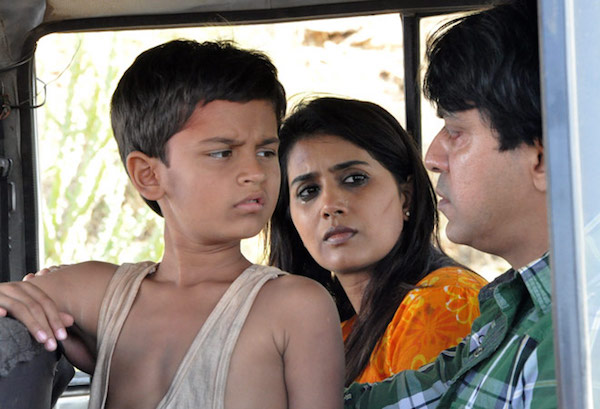
The Good Road
“Four days, five or six co-writers and three mentors — the NFDC Film Bazaar Screenwriters’ Lab created a great environment,” Gyan Correa told Pandolin. “The approach of the lab makes critiques and re-works develop from within the world of the story, and several problems and lost/hidden opportunities in the script became clear to me after that. As a writer, you begin to look at a whole lot of new perspectives, all of them very relevant. Lastly, pitching the script to a real set of producers, fielding all their questions, takes the project one step closer to screen.”
“It’s always wonderfully instructive (and grounding) to see and experience life outside the fishbowl,” he said, on the film’s journey from the labs to the international festivals it has travelled to. “Whatever your genre, writing style, audience, language – the lab can only help budding filmmakers in their journey. If only, and at the very least, to have served them is to to have given them exposure to international, non-studio, independent cinema. A look at the list of films that have come out of the lab speaks for itself, and the quality of Indian stories and scripts are headed up, as should be the case. This is a big country, more diverse than all of Europe, but the process is moving too slowly.”
READ: EVERY GOOD STORY WILL FIND ITS FILM
The Konkani film Paltadacho Munis (Man Beyond the Bridge) by Laxmikant Shetgaonkar has travelled to the Toronto International Film festival, FIPRESCI for Discovery 2009, and won a National Award for Best Konkani Feature Film, 2005.
“I participated in the first lab organised by NFDC with Man Beyond the Bridge,” he shared. “I was mentored by Oscar-winning director Danis Tanovic and screenwriter Olivia Hetreed. My experience was extremely satisfying, as our sessions were personal and intimate in nature as the mentors had thoroughly studied my script beforehand.”
“We had in-depth discussions over form more than the content of story. The mentors insisted on maintaining personal style and yet, making it universal in form. The lab is the only platform in India that provides consultancy to projects that are international in nature. The films made out of this lab have been selected at various international festivals; the in-depth inputs in craft and form by mentors who have proven in international markets is a blessing to Indian writers who create scripts that are different and innovative.”
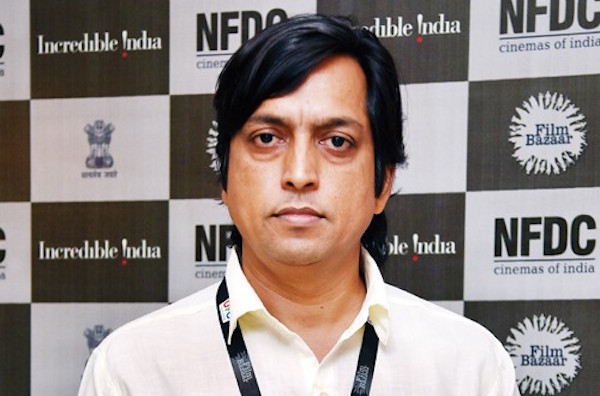
Laxmikant Shetgaonkar
Alankrita Shrivastava’s Lipstick Under My Burkha set in the crowded lanes of Bhopal revolves around the lives of four Indian women and their desires to live their dreams.
READ: MY FILMS ARE MY DIALOGUES WITH THE SOCIETY – PRAKASH JHA
“The Screenwriters’ Lab has been one of my most memorable experiences,” she recounted to us. “Not only did it help me develop my script, it also enabled me to grow as a writer. I felt so nurtured as a writer through the process of the lab. The warmth and generosity of all the mentors and their genuine enthusiasm at seeing the script take final shape has been really heartwarming.”
“I recommend the lab to anyone who is willing to introspect and grow as a writer,” she emphasized. “What really worked for me was that no one was trying to impose their own order into the chaos of my thoughts. Rather I felt I myself was getting empowered to navigate through my chaos. And yes, the lab was special because my mentor Urmi Juvekar, has been like a rock through everything. And she will always hold the most special place in my life for always giving me so much of herself. Her support has been steady and unconditional. And it was special because we were a lovely group – Kanu Behl, Ruchika Oberoi, Siddharth Sinha, Anupam and Umesh Kulkarni! We learnt a lot from each other.”
“In terms of the actual influence on the script of the film, I feel the lab enabled me to think more deeply about my characters. I feel I was able to dig deeper to find the truth about them. That really enriched the script. Also, technically, I felt I made a big leap in terms of the structure of the screenplay. It wasn’t like all of this happened overnight. But the lab started off a process of thinking and writing, that eventually led to the final screenplay.”
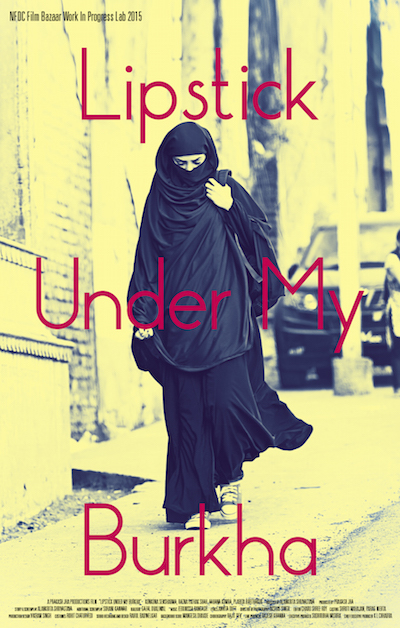
Lipstick Under My Burkha
“I think in India, we still have a long way to go in terms of screenwriting. Writing needs to be considered far more crucial than it is right now. We need to value stories, and writers. We need to develop good scripts. There needs to be a deepening of the culture of sharing scripts and ideas and stories amongst peers for feedback and encouragement. The Screenwriters’ Lab has encouraged the culture of thinking more deeply about the stories we are telling.”
“It is helping us see scripts just as scripts, without necessarily using the same popular traditional Bollywood paradigm. So I feel the culture of script labs is helping us move out of the box, in terms of the choice and treatment of the stories we are telling. Also, I feel the Screenwriters’ Lab and other such initiatives are enabling a more ‘world cinema’ like cinema to emerge from India.”
Other debut films which have left an impact on audiences with their storytelling include Ruchika Oberoi’s Island City (which won the FEDORA Prize at the 72nd Venice Film Festival), Ritesh Batra’s iconic film The Lunchbox’ and Priya Krishnaswamy’s Hindi/Marathi drama film Gangoobai.
“It’s a good time to be a screenwriter in India,” Bikas Mishra hits the nail on the head. “With labs like this one, writers can learn how to develop their scripts so they can attain their full potential. Writers do not have to be at the mercy of directors and producers anymore, and the quality of writing in cinema overall is improving, I’d say. People are now starting to understand the importance of writing and content-driven cinema is on the rise, now that writers are being given their due importance.”
For budding filmmakers all over the country, this is an opportunity not to be missed. If you have a story to tell or a script that is on the brink of coming into its own, be sure to send in your submissions before February 29, 2016 (The extended deadline for the same being March 15, 2016) to gain some objective insight and perspective from established script advisors who will doctor yours to help tie up the loose ends of a story waiting to be told.
For more details, visit – www.filmbazaarindia.com

